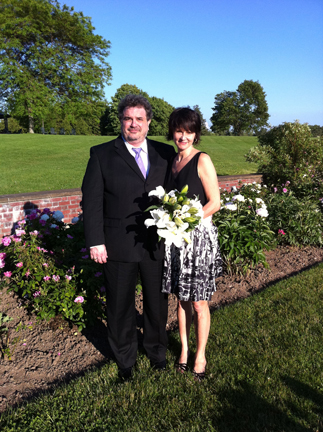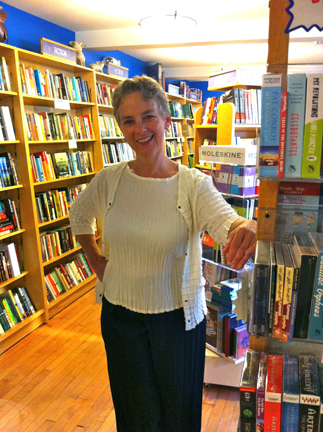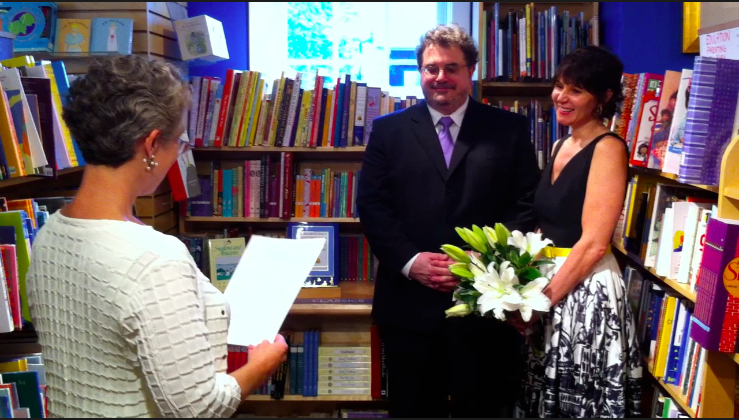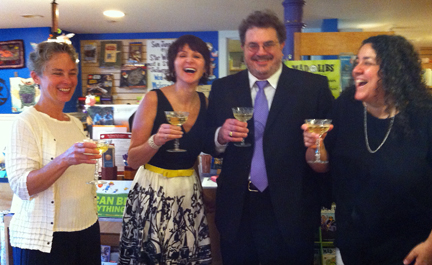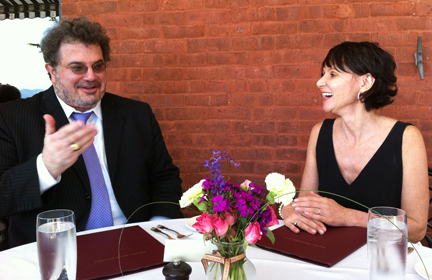In my post Strategies for Summer, I mentioned that we were going to try Thursday morning book talks. Well, we had our first one yesterday and, I must say it went great. One of the things I loved about it was the range of books each staffer picked. 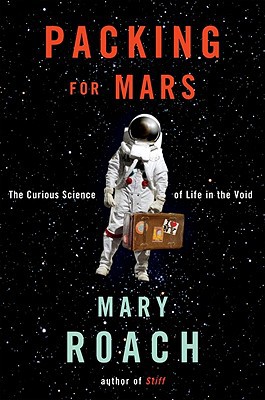
JP, the staffer whose idea it was, had the best attitude 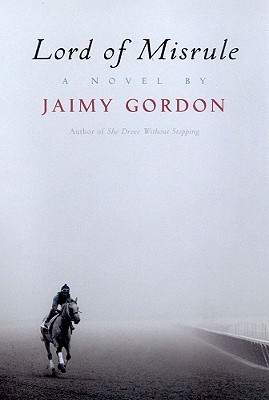 about it. She was all about keeping it relaxed and flexible, which was a perfect counterpoint to my angsting about no one showing up. We’ve only started promoting the talks, and I was fearful that there would be no crowd. Turns
about it. She was all about keeping it relaxed and flexible, which was a perfect counterpoint to my angsting about no one showing up. We’ve only started promoting the talks, and I was fearful that there would be no crowd. Turns 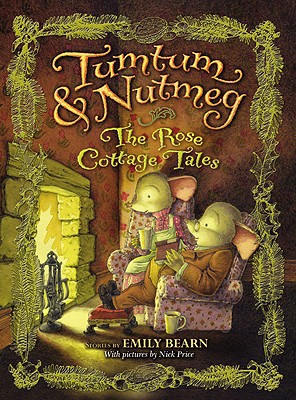 out we had two people who were thrilled to hear the book talks.
out we had two people who were thrilled to hear the book talks.
JP and PJ were the two staffers who did the book talks. JP is a seasoned book talker, having been a school librarian for 20 years. PJ, is our youngest employee at 2o,who has convinced herself that she’s terrified of 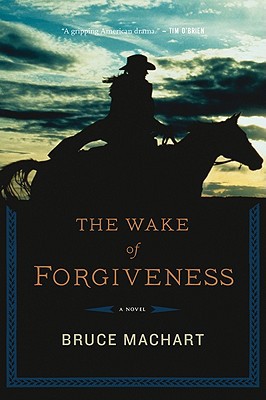 speaking to groups. PJ saw that there were two very friendly people eagerly wanting to hear about books and she wasn’t scared.
speaking to groups. PJ saw that there were two very friendly people eagerly wanting to hear about books and she wasn’t scared.
I worked the register while PJ and JP and were book talking. As I listened, I was blown away by how well they were doing. The book talks were lively, informed and did a wonderful job of talking about the books without giving the plot away. Best of all each woman made everything sound so enticing.
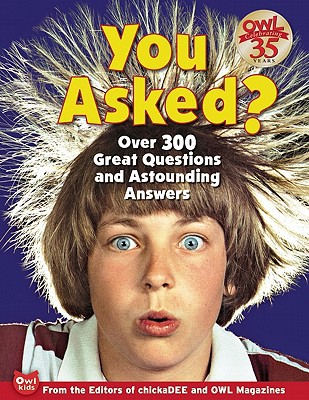 I’m not sure what I was expecting, but the fact that these two customers bought three of four books PJ recommended and two of the four that JP book talked, seemed like really great numbers to me. And while these customers are from out of town, they signed up for our online newsletter, took a paper newsletter and vowed to shop with us online. We served cheese and crackers and a good time was had by all.
I’m not sure what I was expecting, but the fact that these two customers bought three of four books PJ recommended and two of the four that JP book talked, seemed like really great numbers to me. And while these customers are from out of town, they signed up for our online newsletter, took a paper newsletter and vowed to shop with us online. We served cheese and crackers and a good time was had by all.
Who knows what will happen next week? I can’t wait to find out.
Should We Protect the Grown-Ups?
Elizabeth Bluemle - July 7, 2011
As a children’s bookseller, I’m used to dancing the delicate line between guidance and censorship, championing readers’ freedom and respecting/honoring their choices while also trying to steer young people toward books that will most resonate with who and where they are personally and developmentally. Basically, I’ve had fifteen years’ experience doing gut-checks on readers and books when I’m asked for help. What I never expected was to find myself needing to do the same for adults, with adult reading.
Recently, I become enamored of an adult nonfiction title called Shameless: How I Ditched the Diet, Got Naked, Found True Pleasure, and Somehow Got Home in Time to Cook Dinner, by Pamela Madsen. It’s the story of the author’s midlife crisis, her growing realization that somewhere along the way, she’d lost an important piece of herself: the full sense of her identity independent of her societal roles. Most notably, her sense of self as a sexual being. A successful fertility advocate and happy wife and mother, the author had her act together but felt that something big was missing, and she set out to find it.
I love this book as an adult book-group choice because it addresses so many issues familiar to women in our community’s book groups: sex, marriage, motherhood, aging, weight, body image, identity, shame, fear, courage, risk. Even better—in terms of fodder for discussion—is that it’s wildly controversial; I guarantee you that no group of readers will all be in agreement on the nature of the path of self-discovery on which Madsen embarks. (That’s a convoluted way of saying she gets sexy, big-time, and in unconventional, sometimes uncomfortable, ways.) The book is direct and fearless and does not always portray the author in the best possible light. Whether or not you agree with her methods or conclusions, there’s no denying that the memoir takes on a goodly number of personal preoccupations likely to be on the minds of American women over the age of forty. Book group gold! Right? Well, sort of.
While the reaction of individual readers I’ve recommended this book to has been almost uniformly appreciative (one woman did feel guilty even leafing through it), my book-group success has been mixed. I have one book group who wants the author in Vermont yesterday to talk about Shameless; another wants to string me up by my thumbs for recommending such salacious “trash.” Now, I understand that not everyone wants to spend his or her book group time reading and talking about sexuality, but what’s got me puzzling is the intense discomfort of this latter book group.
I was told about a burst of shocked and angry emails that flew fast and furiously after Shameless was announced as the next read. What struck both me and the book group member who talked to me about these emails was the reaction to its very topic — as though sexuality should be recognized as too taboo, too charged, to serve as an appropriate part of a book worth reading and discussing. At most, I expected people to say, “It’s not my cup of tea.” What I wasn’t prepared for is the sense that I should be censoring recommendations to adults, the sense that I would somehow be disturbing the fabric of the universe by suggesting that women might be interested in reading about the experiences of a peer who made different choices from the ones they themselves might make.
I’ve noticed this also with politics, religion, and other hot-button issues: a discomfort (among very well-educated people) to discuss dissenting ideas. Fear of disagreement. An end-run around controversy. Have I been desensitized by my college years at UC Berkeley, or by spending the bulk of my life in large, liberal cities? Is it just me, or has America swung a bit backward on the pendulum, toward Puritanism and discomfort with ideas different from those held by the reader? Heck, maybe I’m expecting us to be western Europe. Whatever the case, I’m surprised. I guess that’s the nub of what this blog post is about: wondering if we are all seeing a creeping increase in closed-mindedness. Do we want every book to be a mirror of ourselves?
How is this related to children’s bookselling? Well, dear readers, I suppose my mind travels down this path: If we adults are so averse to controversy, so alarmed by that which might prove to be uncomfortable, how will we raise our children to think critically, to discern, to debate, to wonder and explore?
And do I now need to worry not only about what I recommend to kids, but to adults?
Laugh of the Weekend
Josie Leavitt - July 5, 2011
A longtime favorite customer published a book last week with a very local publisher. The book looks lovely. The publisher threw a massive book launch at the Inn at Shelburne Farms (see a previous post to see how beautiful it is). Mary, the author, is a stately older woman, who was basking in the glow of more than a hundred friends celebrating her book release.
The store’s copies of the book were delivered the following morning by 11. Mary had already called at 10:30 to make sure we were getting our copies that day. Something has changed in Mary. Gone is the book-buying Mary. She has been replaced by anxious local author. Please understand, I love Mary. She’s been a good customer and I’m thrilled for her book.
As with many brand-new local authors, she calls every day to see how we’re doing on stock. She came in Saturday to check the placement of her book. Elizabeth had smartly faced out our stack of 10 in the Vermont section which is right by the front door. Honestly, better placement is hard to find.
Well, Mary came in and saw the case and asked Elizabeth if she might have better placement. Elizabeth deftly handled the situation by saying that after our event it would move to the register. Elizabeth asked Mary what she’d like to see, and Mary said with dead seriousness, “Well, I want someone standing there by the door, holding the book.” And then she smiled impishly. I burst out laughing.
Honestly, I’m still laughing.
Strategies for the Summer
Josie Leavitt - July 1, 2011
Last week, we had a really productive staff meeting. The meeting had two parts: the reality part, and the brainstorming part.
The reality part of a staff meeting is where I share with the staff some of the money facts of the store. I think it’s really important to let your staff know how the store is doing, or if you have a monetary monthly goal in mind. We necessarily set these kinds of goals because I feel like so much of the store being busy is out of your hands. So, I set a challenge for everyone to sell two extra books a day. I read somewhere that a bookseller’s goal was to sell five extra books a day; I loved the idea and am freely copying it.
The challenge of selling two extra books per person is actually fairly complex. You just can’t say to a customer, “buy an extra book today, would ya?” This is where the art of handselling comes to play. By listening to a customer you can tell if they are jealous about getting only their kids summer reading books. All it takes is asking them if they’d like a book for summer. And more often than not, simply by checking in with a customer more than once can change a transaction for the better. People will often say they don’t need help when first asked, but after a few minutes, when asked again nicely if they need help, they will often say yes and then tell you what they’re looking for.
We’re also viewing summer as Christmas, not just for increased sales, but for the fact that some of these customers we’ll only see once. While we can order most any book and get in often the next day, that doesn’t seem fast enough to someone on vacation who’s desperate to read “that book now.” Our job is to do our best to get that book, but if we can’t we should always suggest another title instead. There are plenty of times when someone really only wants a particular book, but many folks are just eager for a really good book. It’s our job as booksellers to make another book sound just as appealing. This is a skill. First, the bookseller has to understand precisely what the customer is seeking and secondly, be able to come up with another title that fits that bill, and thirdly to be able to talk about it with passion.
At the meeting we brainstormed different ways to get customers in the door. How do we create an event that will draw in people on a regular basis. One staffer, JP, suggested having summer reading book talks. We all agreed that this was a great idea. So, once a week, starting next week for an hour, we’ll be offering our suggestions for summer reading for any and all who want to come. We’re working with a local lunch cafe to provide light refreshments, so we’ll promote his food and get a massive discount.
I have no idea how many people will come, but I love the idea of having to prepare for a booktalk each week. It will just make us all better booksellers and it’s fun to talk about our favorite books.
A Friend in the Dumps
Josie Leavitt - June 30, 2011
It’s not every day when you open displays and they’re full of books your friend wrote. On Monday it was my very happy pleasure to  unbox several cartons of Middle School: The Worst Years of My Life, written by James Patterson (this is his first foray into middle-grade realistic fiction) and Chris Tebbetts.
unbox several cartons of Middle School: The Worst Years of My Life, written by James Patterson (this is his first foray into middle-grade realistic fiction) and Chris Tebbetts.
Chris has been a customer of ours since 2005 when he quickly became a friend. He and my partner, Elizabeth Bluemle, often run into to each other at various writing retreats. After talking about playing tennis for the past two years and not ever making it to a court, Chris and I finally began playing this year.
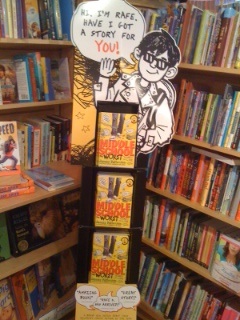 It’s a lovely thing when someone you know writes a book. Chris had already been a published author when we met him, but this feels like a BIG book. I put together the display dump with a smile on my face. I can say, that after 15 years of setting up displays I have never filled it with books co-authored by a friend.
It’s a lovely thing when someone you know writes a book. Chris had already been a published author when we met him, but this feels like a BIG book. I put together the display dump with a smile on my face. I can say, that after 15 years of setting up displays I have never filled it with books co-authored by a friend.
As soon as I was done with the display I was full of questions for Chris, so I sent him an email. The first question was really simple: How did you get hooked up with James Patterson?
He got my name from a book packager where I did a fantasy adventure series (The Viking) several years ago. He asked to see some sample chapters from me, and this project was the eventual result.
My second question was one that I’ve often wondered with co-authored books. Just how did the collaboration process work?
Jim wrote a detailed chapter by chapter outline of the book, along with some beginning chapters to establish the tone and the voice of the whole thing. I then took that outline and started drafting the rest of the story, in consultation with him each step of the way. Then, at the end of that process, he took the manuscript and wrote the whole thing to completion. Also, in this case, there was an illustrator, Laura Park, who created the visual world of the story once it was written.
And my final question was purely of self-interest, as I’ve sold half of my display already: will you two be writing another in the series?
Happily, yes! We’re right in the middle of working on Book Two in this Middle School series.
I guess the new deadline for book two is why we haven’t played tennis lately. As sad as I am for that, I’m thrilled for the success of the book, and for now I will content myself with keeping Chris in the dump.
Honk for Humor
Elizabeth Bluemle - June 28, 2011
 Here at the Flying Pig, we’re suckers for good writing — and very appreciative of the talent required for good funny writing. When I was in the Vermont College MFA program in writing for children and young adults back in the early aughts, I noticed that a significant majority of awards and scholarships given to students tended to go to the tonally serious works of literary fiction. They were deserving and powerful pieces, to be sure, but my funny comrades’ novels, with words that may have trodden more lightly on the soul but enlivened and enriched their readers equally, were left in the dust. Why was this the case?
Here at the Flying Pig, we’re suckers for good writing — and very appreciative of the talent required for good funny writing. When I was in the Vermont College MFA program in writing for children and young adults back in the early aughts, I noticed that a significant majority of awards and scholarships given to students tended to go to the tonally serious works of literary fiction. They were deserving and powerful pieces, to be sure, but my funny comrades’ novels, with words that may have trodden more lightly on the soul but enlivened and enriched their readers equally, were left in the dust. Why was this the case?
It’s no secret that comic novels have had a tendency to be overlooked by big prize committees, in much the same way that Best Picture Academy Awards tend to favor the serious. I think humorous writing has gained more respect in recent years, and most of us understand how difficult it is to do really well. But I wonder if we adult readers and critics still tend to discount or distrust laughter-inducing writing as a literary achievement.
As a child reader, some of the books that spoke most deeply to me had a good deal of humor and/or comedy woven into their souls: Charlotte’s Web, The Trumpet of the Swan, Harriet the Spy, The Little Prince, Nobody’s Family Is Going to Change, A Girl Called Al, The Phantom Tollbooth, and so many more. Heck, even the seriously epic Lord of the Rings trilogy is leavened with comic relief and hearty humor. Deep messages may be delivered with a light touch.
 It occurred to me that I could do more than simply bemoan the lack of recognition for humorous works. So in 2004, we created the Flying Pig Grade-A, Number-One-Ham Humor Award, or FPGANOH-HA! (In case you’re curious, this acronym is pronounced EFF-pah-gah-no-HA! and is a great deal of fun to say with gusto. Try it.) The monetary prize — currently $735 — is given to the best submitted humorous piece in any genre by unpublished Vermont College MFA students in the Writing for Children and Young Adults program. For the first several years, we limited the competition to first- and second-semester students. There were few awards and scholarships open to them and we felt they would most benefit from early encouragement. But it’s a small student body, and for the last couple of years, we’ve opened to the entire student body. They must still be unpublished, however. Aspiring authors need as much reinforcement as they can get; those pre-publication waters are tricky to swim. (Post-publication waters are tricky, too, but in totally different ways. Ah, commerce. However, I digress.)
It occurred to me that I could do more than simply bemoan the lack of recognition for humorous works. So in 2004, we created the Flying Pig Grade-A, Number-One-Ham Humor Award, or FPGANOH-HA! (In case you’re curious, this acronym is pronounced EFF-pah-gah-no-HA! and is a great deal of fun to say with gusto. Try it.) The monetary prize — currently $735 — is given to the best submitted humorous piece in any genre by unpublished Vermont College MFA students in the Writing for Children and Young Adults program. For the first several years, we limited the competition to first- and second-semester students. There were few awards and scholarships open to them and we felt they would most benefit from early encouragement. But it’s a small student body, and for the last couple of years, we’ve opened to the entire student body. They must still be unpublished, however. Aspiring authors need as much reinforcement as they can get; those pre-publication waters are tricky to swim. (Post-publication waters are tricky, too, but in totally different ways. Ah, commerce. However, I digress.)
What this means for us is that every spring, Josie and I get a thick pile of anonymous manuscripts (or an email full of pdfs) to read, and it’s SO MUCH FUN to read and discuss them, and wrestle with the final decision. That is the situation we face at this very moment—with a particularly good set of submissions!—and the reason I am ending this blog post in a moment. We have a final decision to make. Wish us luck; it’s a toughie.
Do you think funny books are overlooked by award committees?
In praise of all books humorous and rich, I would like to invite you to share your favorite funny 2011 titles. Perhaps one of them was even written by a former FPGANOH-HA! winner.
Good Idea? Bad Idea?
Josie Leavitt - June 27, 2011
We’ve taken the plunge, with the help of Google eBooks, to begin selling e-books on our website. Is this a good idea, or a bad idea? Only time will tell. My naive self thinks it could be a win-win, but the cynic in me thinks it could be the beginning of the slow and painful death of brick and mortar stores.
The hopeful in me thinks that my customers who have e-readers will now buy their e-books from me. Thereby, shopping local for their e-readers. It needs to be stated that only customers without Kindles can buy e-books from me. Kindle owners will continue to frequent Amazon and that could have more of a negative effect on the stability of physical stores than anything else. (This is a discussion for another day.) I should say, a lot of my e-book reading customers continue to buy physical books. They split their book purchases half and half with their e-readers and the book. These are the customers I think we’ll get to buy e-books, and these are customers who up till today, haven’t been buying e-books from me. I can’t help but feel that being able to buy e-books from their trusted indie might garner more e-book sales than I think.
The cynic in me thinks too many people are now reading e-books, that a physical store might become unnecessary, and my selling the e-book is just contributing to my own demise. It’s a tricky situation. But to not offer e-books seems like I’m forcing customers to leave my store to buy their e-books.
No one knows what’s going to happen in a year, or five. I can’t imagine that bookstores will become obsolete. There are too many people who don’t have e-readers, or interest in them, that I think the need to hold a book will always remain. My fear is that the twenty somethings, who love their technology, will always want e-readers. And then there the kids who are growing up wired to everything and might not have the affection for the physical book as most adults who grew up with books do now. I wonder what four-year-olds, who might be playing with e-book apps, are going to feel about physical books when they have their own disposable income.
So, I’m standing on the precipice of a new bookselling age. I have been obsessively checking my website to see if I’ve sold any e-books. It’s only been four hours, and so far, I haven’t sold any.
There is for sure one up-side to customers being able to buy e-books from me: fewer awkward moments at the supermarket when a customer confesses that the reason they haven’t been into the store for a year is because they’re reading books on their iPad.
A Very Personal Event
Josie Leavitt - June 24, 2011
Wednesday night we had the pleasure of hosting Melissa Coleman, who presented her lovely memoir, This Life Is in Your Hands: One Dream, Sixty Acres and a Family Undone to a crowd of more than 50. 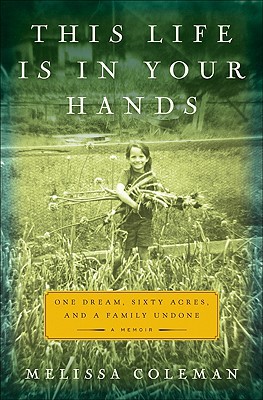 The book is wonderful, so I was confident we’d get a good turnout, despite the very heavy rain we had. What I didn’t expect was a truly personal event, with many people from Melissa’s past in attendance.
The book is wonderful, so I was confident we’d get a good turnout, despite the very heavy rain we had. What I didn’t expect was a truly personal event, with many people from Melissa’s past in attendance.
I’m not giving anything away to say that the tragedy in the book is the accidental drowning of Melissa’s younger sister, Heidi, when she was three. To have the author speak of her writing process as getting her little sister back, left few in the audience without a lump in their throats. I loved this book, having practically devoured it in one sitting, but to hear parts I found moving while reading, read aloud, was particularly moving.
Melissa is a good reader. Her honesty about not wanting to read some parts aloud “because they make me sad” was just so heartfelt. Melissa’s first draft, she said, was terrible. “Like a donut without a center. I needed to find the center.” So, she set out to fill in some of her childhood by seeking out the farm apprentices. 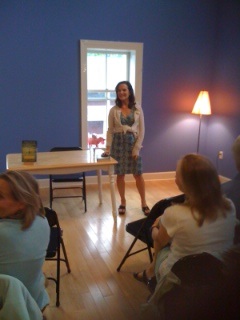 Melissa’s parents were followers of Tim and Helen Nearing, who had a 60-acre farm right next to theirs. To help them run their farms, both families had apprentices, “all of whom arrived in a VW and had found The Good Life by the
Melissa’s parents were followers of Tim and Helen Nearing, who had a 60-acre farm right next to theirs. To help them run their farms, both families had apprentices, “all of whom arrived in a VW and had found The Good Life by the 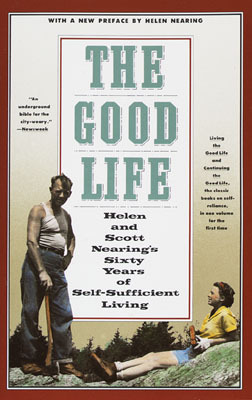 Nearings in a health food store,” to do farm work. What I was not expecting that five of them would be at the event. They shared stories of Melissa’s childhood, that she herself might not have known because she was too little when they happened. These folk had been there for a long time. It was like the book came to life, especially after Melissa read the passages that included the apprentices in the room.
Nearings in a health food store,” to do farm work. What I was not expecting that five of them would be at the event. They shared stories of Melissa’s childhood, that she herself might not have known because she was too little when they happened. These folk had been there for a long time. It was like the book came to life, especially after Melissa read the passages that included the apprentices in the room.
I just loved this event for that. Everyone was so naturally at ease telling these stories. And the signing line was leisurely as even more people wanted to share stories. Melissa also did something I’ve never seen an author do at the start of the Q&A portion: she asked us a question, “What brings you here tonight?” And that really set folks at ease and the conversation just started.
I think because the book deals with a horrible tragedy there was an emotional tone to the event to begin with. Melissa asked us to help illustrate a point by singing “Michael Row Your Boat Ashore” (a song sung on the farm with great regularity). Rather than having her read it aloud, this helped make a point in the book about the solstice and of life: the light always comes back around no matter what happens.
Paying for Events
Josie Leavitt - June 23, 2011
There has been a lot of discussion this week about the practice of asking customers to pay for events, starting with an article in the New York Times on Tuesday. It’s a very interesting question and reflects the changing nature of author events. Ultimately, events exist for several reasons: to support the author’s newest book, and his/her backlist, to sell books, and to allow fans to meet the author. There needs to be a balance among these variables at all times, and we need to understand that with different sales avenues, books may not be purchased at the store hosting the event. Bookstores need to make money on events, as they cost money to put on. We provide wine and cheese at all adult events and that’s not always reimbursed by the publishers.
Booksellers have been talking about how to give bookstore events more value, and thereby encouraging customers to buy event books at the store. One way of adding value to the events was charging for them. Amazon, for all its low prices, will never host events, so it’s very disheartening to see people come to events with books purchased there. People sometimes think “free” means “less important.” Therefore, charging for something, even a nominal fee, can imbue an event with more significance than a free one. Making someone buy a ticket for an event also ensures that ticket purchasers will be far more likely to come to the event. And more information the bookstore has about the number of tickets sold can really help them make informed event orders and return fewer books after the event.
We don’t charge for events, adult or children’s. I feel like it’s a slippery slope to start charging, but I’m torn. On the one hand, I’d love it if every attendee bought a book, but I feel like I can’t mandate that, unless it’s a huge author and we’ve rented a space to accommodate the crowd. On the other hand, I do think a $3 ticket seems reasonable, especially if the cost of the ticket can used for the book purchase. This feels like a small enough amount that most people can probably afford it, and not feel beholden to buy a hardcover.
I’ve heard some stores deal with the “bought the book somewhere else” conundrum buy assigning tickets for the signing line based on where folks bought the book. Buy the book at the store, you’re at the front of the signing line, bought it from Amazon or somewhere else, you’re at the back of the line. This feels punitive, but it does help reinforce that supporting your local store will be appreciated by the store, and you will be rewarded for it.
With children’s events there is always the question of how many books from home can someone bring into the event to be signed. Often, the author will have guidelines about how many books they’ll sign from home. Other times, it’s up to the store to set a policy. This is a touchy area. I don’t expect kids to understand the complexities of this, but parents should be mindful of the purpose of an event, and get the new book signed first and maybe one or two brought from home, and then get back in line if they want all the books from home signed. This is respectful to everyone and can keep everyone happy.
What are your thoughts on charging for events? Do you mind paying for events?
PS: We had an event last night with fifty people in attendance. Fully half of those folks do not regularly shop at the store. We sold about twenty eight books. I can say with confidence that if I had required a book purchase to attend the event, there’s no way we would have had so many people in the audience. The book in question was Melissa Coleman’s wonderful memoir, This Life is in Your Hands a book that speaks of farming and tragedy in a real way. Had I required some of the farmers who attended to buy the book, I might have had far fewer folks attending the event and as such the event would have lost a lot of its charm and real emotion. (I’ll blog more about this great event for Friday) I think the thing to remember is a great event is remembered by all who attend, and while they might not buy a book that night, they might well remember how that event made them feel the next time they need to buy a gift.
A Flying Pig First: Wedding in the Bookstore!
Elizabeth Bluemle - June 22, 2011
Nothing makes us feel better about our bricks-and-mortar bookstore than when it serves as a unique and meaningful place to friends, family, customers and community members. At the Flying Pig, we’ve been privileged to witness a baby taking his first steps. We’ve been honored (if slightly disconcerted) to hear that a ten-year-old customer—in a family discussion about burial and cremation and other post-life possibilities—expressed her wish to someday be buried under the bookstore: her ideal resting place. Now, after this weekend, we can also claim the immense delight of having hosted a wedding—in the Classics and Poetry section, no less.
A few months ago, I received a call from a friend and former Vermont College MFA classmate, whom we’ll refer to as Gabrielle for the purposes of this post.
Gabrielle told me she and her boyfriend were going to elope in June, and that they really wanted to be married at The Flying Pig. It was a wild and wonderful idea, and perfectly suited to them. She’s a children’s book writer and PR professional; he’s a published art historian. They share a deep love of books and literature, and, although they don’t live in Vermont, they both have connections to the state and great memories here. It was a match, as they say, made in heaven.
We put Gabrielle and Doogle* in touch with our dear friend, hereafter referred to as The Good Judge, who was to perform the ceremony. (*Doogle is Gabrielle’s nickname for her guy, because he is such a font of knowledge that she never needs to search Google any more, and his name starts with a D.) Because this was a top-secret elopement, we successfully resisted the urge to tell everyone we knew to casually drop by the bookstore at 6:00 pm on July 18.
The ceremony was beautiful and intimate and fun — just the five of us. The vows were both classic and contemporary, a template The Good Judge has developed over years of performing wedding services. And the bride and groom were gorgeous: he, rakish and charming; she, beautiful and graceful as Audrey Hepburn. (She was always the stylish one in our Vermont College class. Clearly, no one ever bothered to tell her that most of us children’s book writers prioritize comfort over fashion. Now, before I get flamed, please note that I did say “most.”)
The bride carried lilies; the groom wore a purple tie. Have I mentioned that it was just perfect?
Afterward, we had a champagne toast, then went to dinner at the glorious Inn at Shelburne Farms, and celebrated and laughed and teased and laughed some more, late into the evening. There was a glow around everything that afternoon and night, a glow that will last far into the future of our little bookstore. We wish Gabrielle and Doogle (can’t say that name without chuckling) a rich, light-filled life together and all manner of beautiful—and bookish—delights. We are so honored to have hosted their wedding, and if they ever run into a rocky patch, well, they know where they can find some helpful reading. Heck, we’re related now.

